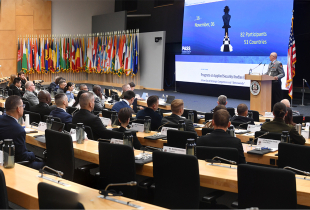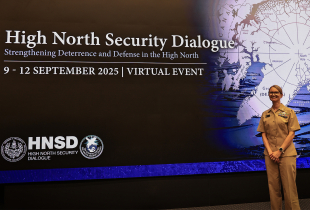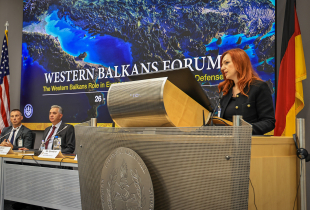
Balkans 360: Southeast Europe Alumni Perspectives on U.S. and German Policy in the Region
Over the past twenty-five years, the George C. Marshall Center European Center for Security Studies (GCMC) has provided resident training in security studies to nearly 1,700 officials from Southeast Europe. In addition to providing a host of in-house programs and courses, GCMC experts frequently travel throughout the Balkans, speaking at myriad outreach events with all levels of the academic and professional security community, ranging from junior officers and civil servants to cabinet ministers and parliamentarians.
All officials who successfully complete courses at the GCMC become part of an active and multi-faceted alumni network that is formally administered in Garmisch. As part of these alumni programs, a Southeast Europe Regional Alumni Outreach Networking Event (SEE ONE) was held in Garmisch on June 18-22, 2018. Thirty-nine Marshall Center alumni, including senior officials from a variety of professional backgrounds from Albania, Bosnia & Herzegovina, Croatia, Kosovo, Macedonia, Montenegro, Serbia, and Slovenia, attended the three-day event, focusing on internal and external actors and factors for regional security. The GCMC College of International and Security Studies used this gathering to examine the region’s security challenges through the eyes of its regional alumni network within the broader context of U.S. and German engagement in Southeast Europe.
This paper summarizes the views of this select group of Marshall Center alumni as well as major takeaways from recent informal and formal talks between GCMC staff and regional actors from teaching trips throughout Southeast Europe.
1) The initial presentation of the Balkans 360 Initiative was positively received by the participants. They welcomed a necessary (re-)focus of German and American attention to the region and to the priorities on the ground. Germany and the United States continue to be perceived as credible and dependable partners for the region, but this is not assured without a reassessment of how and to what degree American and German policy are succeeding in the region. Germany is seen as a more economically active partner with traditional close ties to the “Gastarbeiter” influx of former Yugoslav citizens working in the Federal Republic. Participants called upon the U.S. and Germany to identify “low hanging fruit” where policies could be updated to achieve demonstrable success, to be built upon further.
2) The Euro-Atlantic institutional integration (EU & NATO) process within the region is perceived to be reaching a stage of stagnation, which if not addressed could result in states seeking other partners. The process needs to be more transparent and predictable, particularly as it pertains to EU enlargement. Participants called for Germany to use its influence within the EU to elaborate clear, consistent, and honest messaging for the region about its accession perspectives. This should be accompanied by a fair, uniform, and credible accession process for all interested states that is rooted in stronger ownership by candidate states.
In recent years, a perception has emerged that the EU favors “stabilitocracy” over democracy within the region. This has led to allegations of increasingly poor governance. This approach detracts from the values of democracy, rule of law, and human rights, which are at the foundation of the two major Euro-Atlantic institutions and serve to attract and bind the region to their Euro-Atlantic partners.
3) In light of the vacuum caused by stalled Euro-Atlantic integration efforts, there is growing concern about external actors in the region, namely Russia, China, Turkey, and the Gulf States. Policymakers in Washington and Berlin should acknowledge that perceptions about these actors in the region are not as cohesive as perception of them outside the region. These actors’ mixed roles and activities in the region need to be further examined to determine their impact and to eventually discuss counter-measures.
That said, Moscow’s hybrid activities in the region as well as Ankara’s rhetoric about an Ottoman imperial resurrection, with a focus on obstructing progress on Euro-Atlantic integration, were identified as needing immediate attention and response in the form of an effective strategic communications strategy. Such a strategy would be elaborated around the purpose and value of Euro-Atlantic integration for the region and focus on establishing a clear and credible narrative for the region’s future.
4) Migration continues to be perceived as a major security issue for the region, with concerns that some migrants pose a threat to domestic public order and security (including “traveling jihadis” and a potential increase in ordinary crime). Migration is also perceived as a threat to good neighborly relations. Southeast European states do not always seem to have a coherent means of managing the migrants. Even though numbers have declined since 2015, there is an acknowledgement that these flows will continue to come in waves and that the region must be prepared. Support from the rest of Europe will also be important. Regional steps undertaken in recent years to slow the flow of migrants to Western Europe were seen to be insufficiently acknowledged by states which benefited from those actions, including Germany.
5) The level of good governance within the region is widely perceived to be low and continuing to decrease. This was clearly reflected in the pre-event survey and discussions at the event and was unequivocally identified as one of the top security challenges for the region. This is largely connected to the growth of transnational organized crime groups, their infiltration to the highest levels of government in some states in the region, and locally unaddressed corruption that pervades all levels of government. Frustration with these issues drives much of the considerable out-migration from the region, exacerbating the underappreciated challenges of brain-drain and demographic decline.
6) A good example for de-facto regional cooperation on transnational security threats has developed, especially at the operational level in the region, in spite of the tension between Kosovo and Serbia. Kosovo’s pragmatic case for INTERPOL membership, as a question independent from that of Kosovo’s statehood, was generally well-received by participants, for example.
7) A symbolically important example of the resolution of a regional dispute has taken place in Macedonia in the form of the Prespa Agreement. This can serve as a positive example for the region and a model for how these states can adopt new policies to effectively advance EuroAtlantic integration. The pending success of Macedonia’s resolution of its name dispute with Greece could also be used to increase momentum for the resolution of other disputes in the region, including that between Kosovo and Serbia.
8) Participants recognized the Marshall Center as a highly-trusted German-American organization with the credibility to convene and host frank discussions on these topics within the region. The Marshall Center should more actively and directly engage educational institutions, political institutions, and academic organizations within the region. Participants also called for a more visible German presence in Marshall Center activities within the region.
For Academic Citation
Drew Beck, “Balkans 360: Southeast Europe Alumni Perspectives on U.S. and German Policy in the Region,” Marshall Center Perspectives, no. 4, September 2018, https://www.marshallcenter.org/en/publications/perspectives/balkans-360-southeast-europe-alumni-perspectives-us-and-german-policy-region.
About the Author
Ryan “Drew” Beck is lead Alumni Specialist for Southeast Europe at the Marshall Center. The author would like to thank the Marshall Center faculty members who collaborated with him on this paper, including Dr. Matthew Rhodes, Dr. Sebastian von Muenchow, and Dr. Tibor Kozma.
The George C. Marshall European Center for Security Studies
The George C. Marshall European Center for Security Studies in Garmisch-Partenkirchen, Germany, a German-American partnership, is committed to creating and enhancing worldwide networks to address global and regional security challenges. The Marshall Center offers fifteen resident programs designed to promote peaceful, whole of government approaches to address today’s most pressing security challenges. Since its creation in 1992, the Marshall Center’s alumni network has grown to include over 13,985 professionals from 157 countries. More information on the Marshall Center can be found online at www.marshallcenter.org.
The articles in the Perspectives series reflect the views of the authors and are not necessarily the official policy of the United States, Germany, or any other governments.


